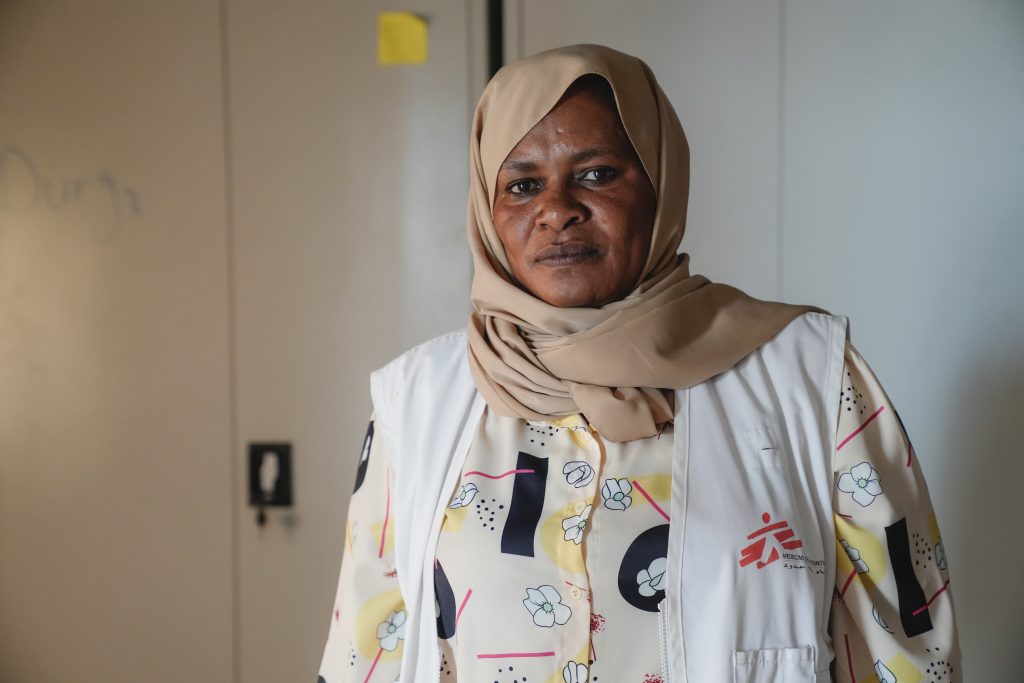I am Majda Rizq, a Sudanese woman filled with compassion for my country. I grew up surrounded by my large family in Sudan, where I learned, worked, married, and established my own family.
Looking back, it feels as though the life I once knew and the memories I made over decades are a distant dream compared to the harsh reality of nearly two years of war. However, one thing that stands out is my humanitarian work.
Looking back, it feels as though the life I once knew and the memories I made over decades are a distant dream compared to the harsh reality of nearly two years of war. However, one thing that stands out is my humanitarian work.
Two years after joining MSF, I met my husband, Mohamed Koko, and we married. He was just starting his work in the logistics department. We had a traditional love story—working together, marrying, and raising two children in their twenties. Our lives have been dedicated to our family, our humanitarian work, and our beloved Sudan.
As life went on, we settled in Khartoum. But on the second day of the war in April 2023, we had no choice but to leave and move to my family’s house in Wad Madani, Al Jazirah state, where my mother and other relatives lived. We stayed there until December 2023, but as the violence worsened, we were forced to leave again, this time heading to El Gedaref, a state where we had no family or support.
Initially, my mother refused to leave her home, but in June 2024, we convinced her to join us. I couldn’t sleep at night, constantly worrying about her. She agreed, but with the promise that we would return to Wad Madani when possible—to her home. Sadly, she passed away in El Gedaref before we could fulfill that promise.
Amid all of this, in August 2024, cholera broke out. I started to work for MSF’s emergency response in El Gedaref city, which involved supporting the internally displaced Sudanese from Khartoum, Al Jazirah, and Sennar states through mobile clinics, cholera treatment centers, and water and sanitation services for the community.
After my mother died, I had to pull myself together…
I remember how critical the situation had been for months: nearly a million displaced people in El Gederaf, a cholera outbreak, and critical gaps in water, sanitation and health services. People were living in the open without shelter, and school premises were being turned into gathering sites. The rainy season was in full swing, and disease outbreaks loomed.
Vulnerable people—including the elderly, pregnant women, and children—were left without urgent support, relying only on charity. Our team worked tirelessly, but the demand far outstripped our capacity, and we were concerned that without a scale-up from other humanitarian actors, the situation would collapse.

When we responded to the cholera outbreak in August, we had already set up a treatment center in the city. But with a new influx of displaced people, the number of cases soared. We had to expand the center, adding more beds and supplies, eventually increasing its capacity to 60 beds. By the end of the year, our team had treated 3,016 cases of cholera.
One of the biggest challenges we faced was the lack of access to clean water. During the rainy season, water sources became contaminated and people had no choice but to drink unsafe water from the ground, putting themselves at great risk.
Imagine animals and humans drinking from the same water sources on their way to El Gedaref. We distributed 3.6 million cubic meters of safe drinking water and constructed 210 emergency latrines to address the situation.
In addition to treating patients, we worked to raise awareness in the communities through every medium we could—spreading health messages, distributing posters, and providing tips on how to mitigate the spread of cholera.
It is not just about MSF
The dedication of the Ministry of Health staff and volunteers in El Gedaref has been crucial. Without their support, we wouldn’t have been able to respond as effectively as we did. This experience is a powerful reminder that the strength of humanitarian work lies in the hands of the people who commit themselves to supporting their communities during times of crisis.
As I reflect on the solidarity of so many, I think of my husband, Koko. Though he’s spent most of his time on international assignments with MSF, whenever there’s an emergency in Sudan, he returns to support. When the war started, he came back again, this time to join me in El Gedaref, where we’ve been responding to many needs.
There are many days when I feel overwhelmed and lose hope, but what keeps me going is knowing that I have my loving family with me, working side by side, supporting one another. We wait for a new horizon—a time of peace when we can return to our big family home, rebuild, and look ahead with renewed prospect.












